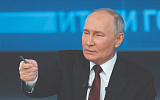These days it is scandal, rather than political ideas or grass-roots campaigning, that fuels Russian politics. And scandal involving foreigners counts most: in Russian eyes, the evidence of law enforcers from abroad is more credible and more damaging than the home-brewed stuff.
Although nobody in Russia has resigned so far, the dirt flying out of investigations in New York, Switzerland and elsewhere could bring down a number of people close to Russia's president, Boris Yeltsin.
It could stymie the chances of those who have been close to him in the past-and who are again poised to seek power in the general election later this year and on the back of the presidential one due next summer. The dirt might even-who knows?-prompt an early exit for Mr Yeltsin himself.
So far the Kremlin's response to the most immediately damaging allegations, of kickbacks from Mabetex, a building company in Switzerland, has been threefold.
One was a flat denial of any wrongdoing. The second was to ensure that the Russian prosecutors working with their Swiss colleagues on a big corruption and money-laundering investigation were removed from the case; one of them, Georgy Chuglazov, says that the details of the kickback allegations, leaked in an Italian newspaper, are "90 percent true." Third, Mr Yeltsin's people have hit back.
Kremlin officials claim that the scandal is orchestrated by the mayor of Moscow, Yuri Luzhkov, a leading contender to win Mr Yeltsin's job.
"I even know who ordered these materials and how much was paid for the publications," Pavel Borodin, the Kremlin property manager involved in the allegations, told a French newspaper last week.
Boris Berezovsky, a tycoon close to the presidential court, has been more specific. "Luzhkov and his henchmen are behind these reports and should be brought to justice," he told the Interfax news agency.
Corruption investigations into Moscow city's crony-ridden and murky finances may embarrass Mr Luzhkov's friends in the months ahead.
One early shot across Mr Luzhkov's bows was a report in one of Mr Berezovsky's newspapers which blamed Mr Luzhkov for another scandal, claiming that the billions of dollars allegedly laundered by Russians through a bank in New York came from Sistema, a company close to the Moscow city government.
The facts of the case remain, indeed, murky. Newsweek reported that a senior FBI official familiar with the investigation cautioned it is still at an early stage, and along with other officials he expressed concern the story may have been prematurely overblown by some media.
"All we know is that lots of money was going in and out of these accounts. Whether it's nefarious or not we really don't know," the FBI official said. "Basically we don't know if this is legitimate money or illegitimate."
The obvious danger for the Kremlin and Luzhkov alike-and, arguably, the only good news for Russia-is that if they continue to throw dirt at each other, Yabloko, a moderate liberal party which prides itself on clean hands, might pick up some extra votes.
To general surprise, Yabloko has been joined by Sergei Stepashin, recently sacked as prime minister, who managed-against the odds-to win quite a few plaudits in the job.
As for Mr Yeltsin himself, he is so unloved these days that allegations of wrongdoing look unlikely, at first blush, to make much difference-unless, that is, they become so grossly damning that they force him to sack a key courtier or even to resign himself. So far, however, the main result is to make the run-up to Russia's general election, due on December 19th, even more tortuous and mucky.
An over-emphasis on money and muck is bad enough; what may threaten Russia's rough-hewn democracy even more is a war in the hills of multi-ethnic Dagestan, where a band of Chechen warlords and Islamist fighters are defying Moscow's authority.
Moscow would not be Moscow if it were not buzzing with elaborate theories about provocation and counter-provocation. Many Russians genuinely fear that people in Mr Yeltsin's entourage, desperate to hold on to power, are hoping that some kind of emergency will pop up to prompt the president to put off the polls.
So it is not even a safe bet yet that Russia's beleaguered power-wielders will keep to the prescribed timetable. What can be said for sure now is that the one thing not on the political menu is any serious thinking about the country's future.





























